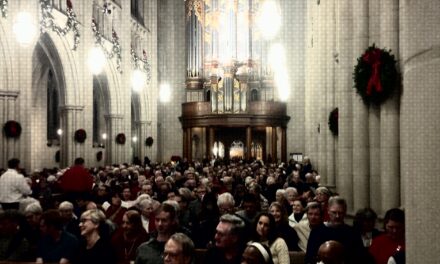Just the name alone long inspired awe, for there was an air of mystery about it. Marisa Galvany. Had to be foreign, definitely, but of uncertain nationality. And when we learned she was from Paterson, New Jersey, and was entirely American trained, we were at once stunned and filled with pride, for here was yet another world-class singer in the mold of our great Rosa Ponselle. Who’d have thought?
That her name has been emblazoned at the tops of operatic broadsides, those big posters outside the great European and South American houses of vocal art, is a given. And her relocation to the Triangle, where she and her husband retired a number of years ago, gave many connoisseurs of superior singing hope that we would once again experience her vocalism. Her returns to the stage have been relatively few and far between. There’ve been master classes at Meredith College and for Triangle Opera Studios (run by Christine Weidinger, another world-class diva who has wound up in our midst) and informal appearances. And there was a rare concert last year to benefit the Duke Cancer Patient Support Program, given in memory of her husband, George Kornbluth. So it was a big deal – a very big deal – when it was announced that Mme. Galvany would offer a recital in Bösendorfer Hall at Ruggero Piano, the program to be announced from the stage.
It turned out to be a newsworthy cabaret-style event with a supremely exalted and generous program of songs and arias that even seasoned reporters from the largest metropoli [sic] would have had to agree was presented with commanding artistry and authority. She was supported at every turn by the outstanding pianist and coach Kate Lewis,* whose work at a handsome Schimmel grand was totally in keeping with the singer’s purpose and intent.
The program – ah, such a program! – consisted of the following:
Falla: from Siete Canciones Populares Espanolas: Nos. 3, “Asturiana,” 5, “Nana,” and 6, “Canción”
Borodin, arr. Wright and Forrest: from Kismet: “Stranger in Paradise” and “And this Is My Beloved”
Giordano: Andrea Chenier: “La mamma morta”
Schubert: Schwanengesang, D.957: No. 4, “Ständchen”
Puccini: Tosca: “Vissi d’arte”
Tchaikovsky: “None but the Lonely Heart,” Op. 6, No. 6 (in Russian)
Kern and Hammerstein: Very Warm for May: “All the Things You Are”
Verdi: from Aida: “Ritorna vincitor” and Amneris’ portions of the Judgment Scene
Sieczyński: “Vienna, City of My Dreams” (in English and German)
Lehár: Land of Smiles: “Dein ist mein ganzes Herz” (in German and English)
Fain and Kahal: “I’ll Be Seeing You”
These were interspersed with informative commentary on the music and the artist’s work during her career around the world and then followed by a substantial question-and-answer session during which she spoke about her husband, performing Strauss’ Salome, learning (or not) from recordings, deciding to become an opera singer, her teacher, and the responsibility of artists to their audiences, capped by a little tale about room service in a Spanish hotel and a tenor named Plácido Domingo.
It was quite an evening.
Those who were there were surely amazed.
Those who weren’t should be alert for announcements of future appearances here.
Brava Galvany!
Readers may hear Galvany in various YouTube clips, including excerpts from Donizetti’s Maria Stuarda, Verdi’s Nabucco, Simon Mayr’s Medea in Corinto, and Verdi’s Macbeth, the latter taken from a complete film of the opera made for the CBC.
*Speaking of Kate Lewis, whose work encompasses playing for the North Carolina Opera, it is unfortunate that this program competed head-on with the NCO’s new production of La Traviata – but there’s a repeat of the latter on Sunday, March 1, so Galvany fans have another shot at Verdi’s tear-jerker.











